
26 Nov, 2014
Advancing ASEAN cultural integration: Mosque tours workshop held in Bangkok
Bangkok – The goal of ASEAN cultural integration took a major step forward over the Nov 15-16 weekend with the first workshop on guiding visitors through Islamic mosques in Thailand. About 30 Muslim guides and travel industry executives attended the workshop organised by Imam Abdul Ahad (Mr. Thanarat Watcharapisud) of the Haroon Mosque, one of Bangkok’s most iconic Islamic structures.
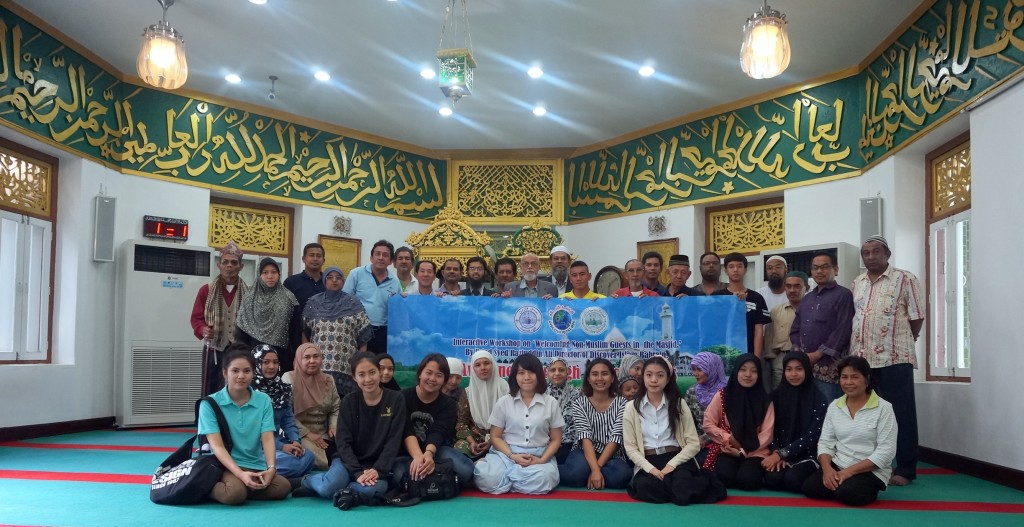 A group photo of the participants inside the Haroon mosque |
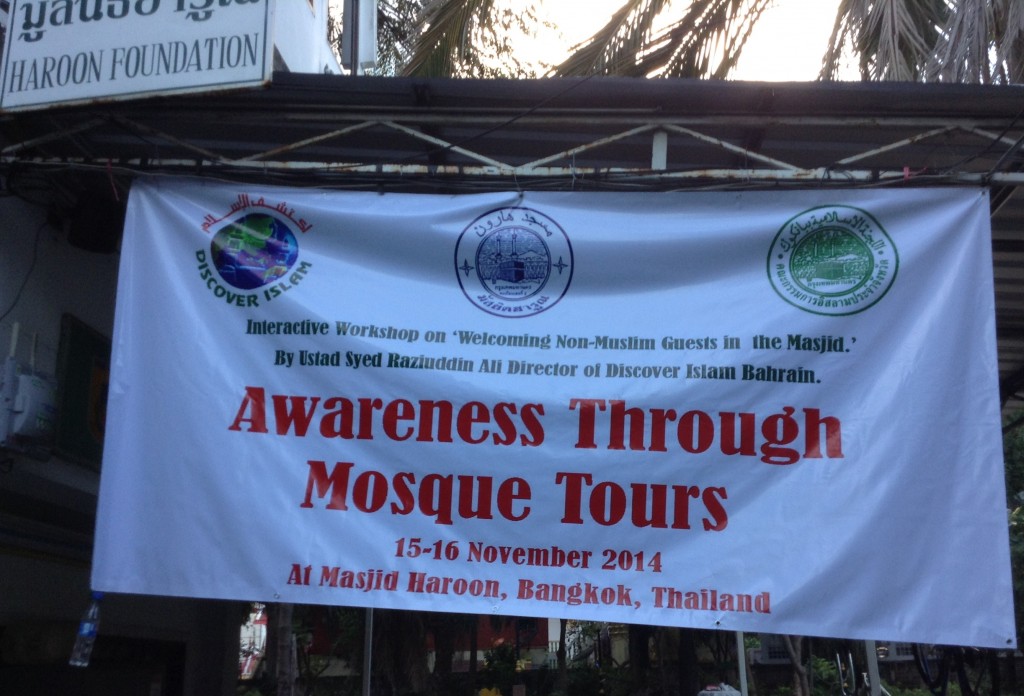 |
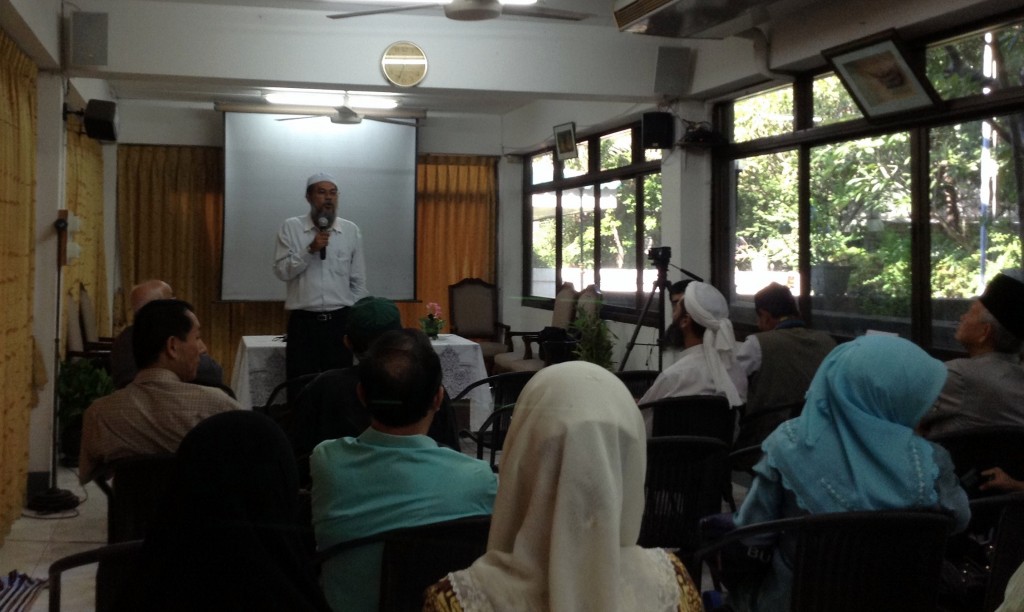 Imam Abdul Ahad introducing the workshop |
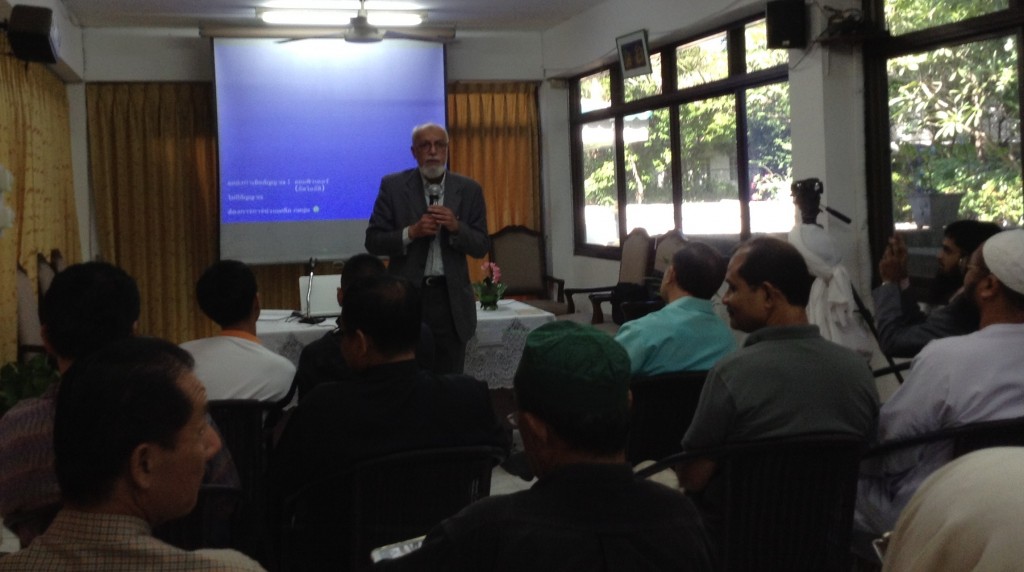 Workshop instructor Syed Raziuddin Ali |
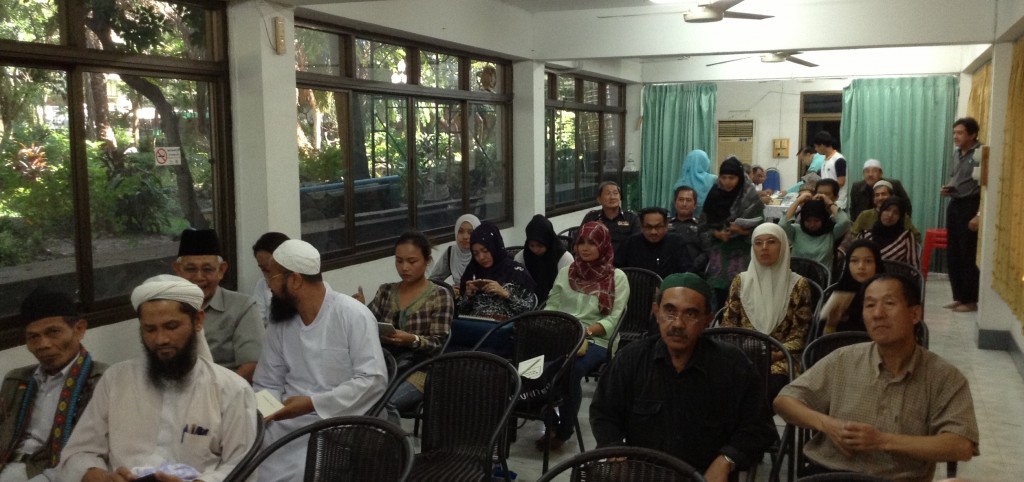 |
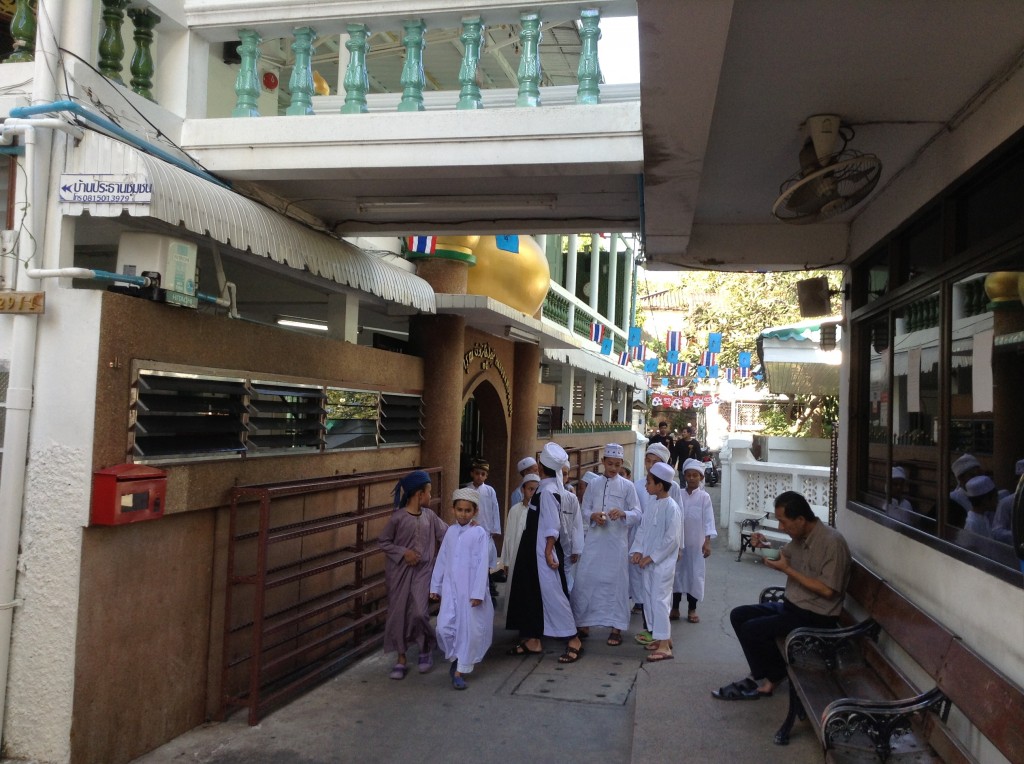 |
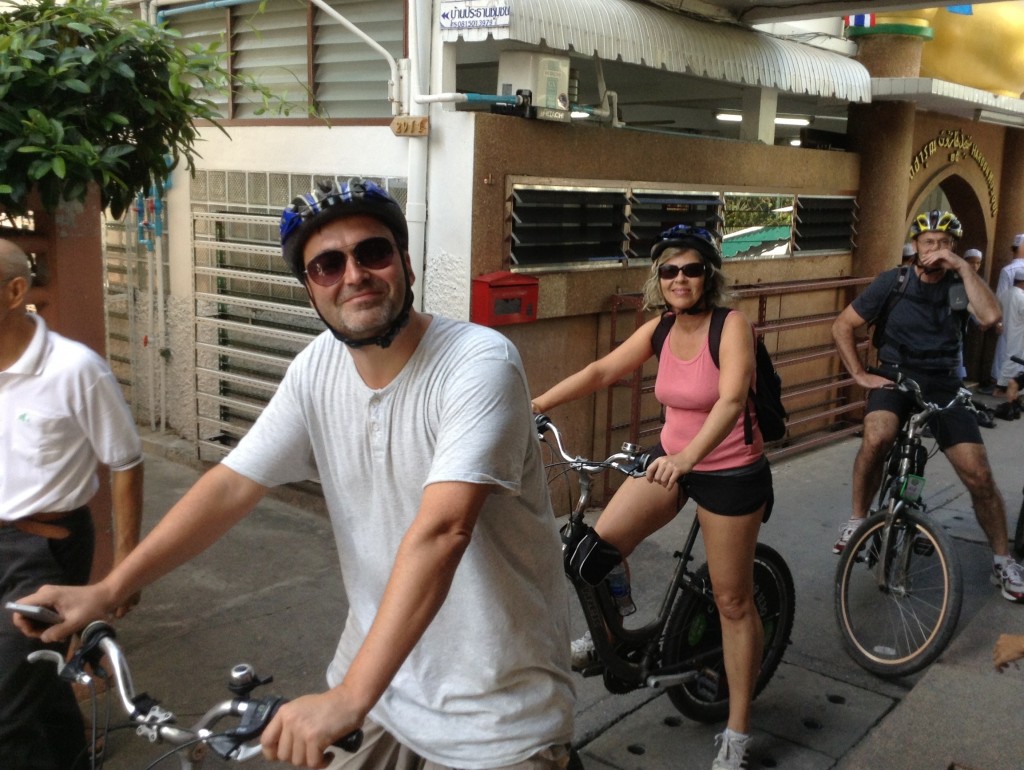 Just before the workshop started, a group of visitors on a bicycle tour passed by. |
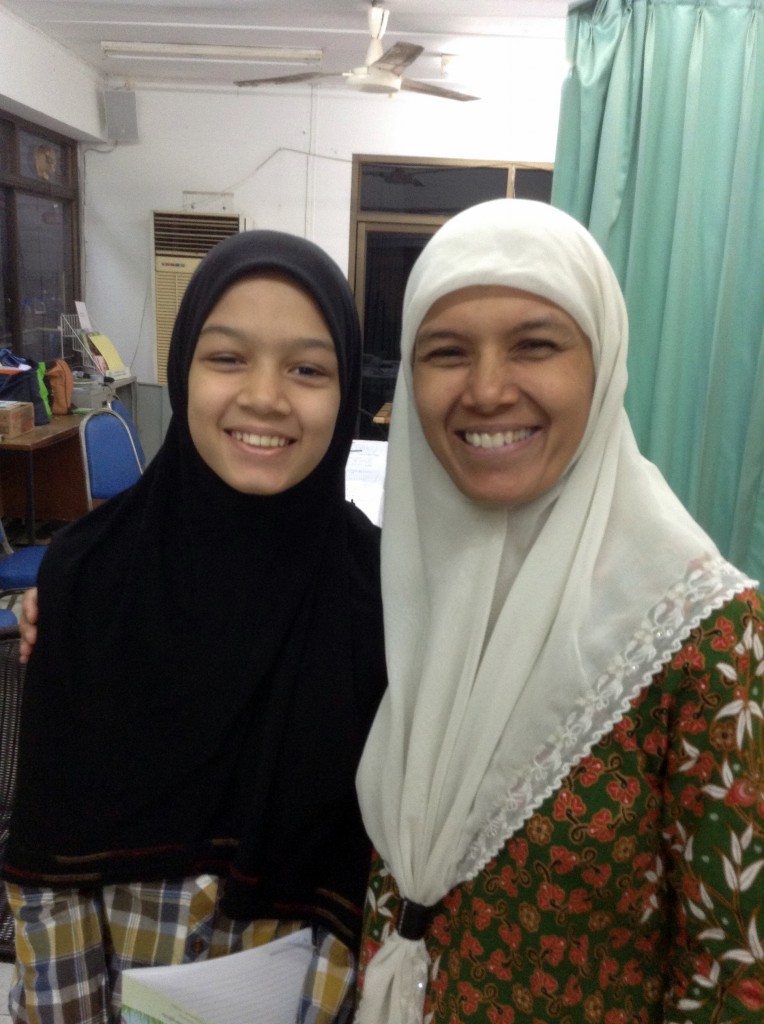 Mrs Noorjehan Ali (right) and daughter |
Located right next to the French embassy and The Oriental Hotel, and on the banks of the Chao Phraya river, the Haroon mosque is featured in the itinerary of some walking and cycling tours in the popular tourist area. Named after Sheikh Haroon Bafadel an Arab (Yemen) Indonesian merchant from Pontianak, West Kalimantan, who first came to the area in 1828, the mosque was originally a small “musalla” (an elevated floor wooden structure to perform Islamic rituals and religious ceremonies) but converted into a proper structure in 1901 by his son. One of its decorative highlights is a lamp bestowed by King Mongkutklao or King Rama VI.
Over the years, it has welcomed members of the Thai Royal Family and former heads of state, diplomats, business leaders and even Cardinals from Vatican City. Friday sermons are delivered in Thai and English to facilitate both locals and growing number of foreigners from Asia, Africa, Europe, America and Arab countries. Buddhist monks and patriarchs have participated in interfaith programs. Each night in the month of Ramadan, the fasting month, Masjid Haroon provides break-of-fast meals to Muslims and visitors.
In his introduction to the workshop, Imam Abdul Ahad said, “Masjid Haroon warmly welcomes tourists, visitors, students, and lecturers and individual from other faiths who would like to seek knowledge about Islam and the Bangkok Muslim community. The mosque is more than 100 years old but the community has been living here for 200 years. We get many visitors here all the time. They are always welcomed as guests and treated in a very friendly manner. The reception is their first point of contact. They make an impression about us where they meet us first.”
The “Awareness Through Mosque Tours” workshop is in line with the ASEAN integration process, especially socio-cultural integration, and balances the excessive emphasis being placed on economic integration. It helped to highlight the fact that after 2015, the ASEAN population will comprise 42% Muslims and 40% Buddhists. Integration between the two faiths will play a critical role in meeting the objectives of the ASEAN Socio-Cultural Community Blueprint which is to “realise an ASEAN Community that is people-centred and socially responsible with a view to achieving enduring solidarity and unity among the nations and peoples of ASEAN by forging a common identity and building a caring and sharing society which is inclusive and harmonious.”
The workshop instructor, Syed Raziuddin Ali, a Bahrain-based retiree originally from Hyderabad, India, said he gives mosque tours to expatriates living in the Gulf state, especially to newcomers who want to better understand Islam and dispel some of the outright lies, myths and misconceptions peddled by the mainstream media.
He said, “These tours are done in in a way that makes sense to the visitors, and interests them in asking questions. That is what we want, so that we can build bridges of respect and understanding. We call all our visitors brothers and sisters in humanity. We all share common human values. That is more important for all of us to understand. Once we stop categorising each other as Muslims or non-Muslims, and they stop asking whether we are Shia or Sunni, then it becomes very easy to conduct a dialogue. This is not like a guided tour in the museum. We do not want to make them bored. We are not here to impose anything, just here to share knowledge.”
The two-day workshop generally went off well. There was no shortage of pertinent questions. One of the participants, Mrs Noorjehan Ali (aka Pam Akarapisan), a U.S.-educated former official of the Thai Ministry of Foreign Affairs, told this editor that she is often called to guide visitors to mosques in the northern Thai city of Chiang Mai, where she works as Programme Coordinator of American Study Tours at Payap University.
While most of the questions she gets are polite and respectful, she said she also gets the usual ones stemming from ignorance and stereotyping, such as: Why does Islam allow four wives? What do you personally think about that? You look like a highly educated woman, why do you chose to do this to yourself (a reference to her hijab)? Can you leave your house to work? Have you been beaten by your father? Do they impose hijab on you? Can you drive? Why don’t men have a dress code, too? Can non-Muslims touch the Quran? Is it okay for non-Muslims to walk in the prayer area (of a mosque)? One questioner referred to the Quran as the “Satanic Verses”, the controversial novel by Salman Rushdie.
Another listened to the entire explanation and then asked Mrs Ali, “Where do you send your people for training?” That confused Mrs Ali for a moment before it dawned on her that the questioner was darkly suggesting weapons training.
However, Mrs Ali said there were also many positive moments. One Christian evangelical lady, after getting a better understanding of Islamic tenets, came up and embraced Mrs Ali, telling her that she would be leaving with a “changed impression” of what Islam really stood for.
Masjid Haroon and Haroon Community welcome all decent visitors from different faiths.
Visiting hours:
Daily 9.00 – 11.30 and 13.30 – 15.00.
Friday Prayers are from 12.15-13.00
Mosque Etiquette
1. Visiting mosques is a learning experience and may become a highlight of your trip.
2 . Leave your shoes on the rack at the entrance.
3. Avoid unnecessary conversation inside the mosque. Turn off mobile phones, don’t chew gum, and do not bring food or drink inside of a mosque.
4. Modest dress is required. Gown is available for visitors for temporary use.
5. Refrain from applause or clapping hands or yelling in the mosque. Serenity is appreciated.



Liked this article? Share it!